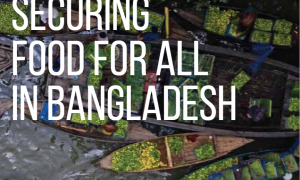Search
Gender in agriculture and food systems
Food is the most important basic need for sustenance and survival, and the right to food is among the fundamental human rights.
Securing Food for All in Bangladesh presents an array of research that collectively addresses four broad issues: (1) agricultural technology adoption; (2) input use and agricultural productivity; (3) food security and output markets; and (4) pover
There are two strands in the socioeconomic literature on aquaculture.
Despite declining arable agricultural land, Bangladesh has made substantial progress in boosting domestic food production, improving access to food by increasing household income, and enhancing nutritional outcomes
Women’s empowerment and gender equality in agricultural value chains: Evidence from four countries in Asia and Africa
Women play important roles at different nodes of both agricultural and off-farm value chains, but in many countries their contributions are either underestimated or limited by prevailing societal norms or gender-specific barriers.
Amid concerns about the beginning of the COVID-19 pandemic, Guatemala, in January 2020 decreed travel bans from China, which were later expanded to other countries.
Staying afloat in the milk business: Borrowing and selling on credit among informal milk vendors in Nairobi
Studies on credit schemes for small-scale entrepreneurs have documented their potential to alleviate poverty and improve food security, nutrition, and health outcomes in low- and middle-income countries.
This brief summarizes the recent assessment of the implementation of the Agricultural Technical and Vocational Education Training for Women Program (ATVET4Women) that aims to support women and their families with vocational training and market lin
From December 6-10, 2020, USAID organized and IFPRI facilitated five virtual stakeholder consultation workshops on agricultural research and biotechnology, bringing together relevant stakeholders involved in crop and non-crop agriculture from Bari
Does market inclusion empower women? Evidence from Bangladesh
Increased market inclusion through participation in agricultural value chains may increase employment and household incomes, but evidence on its empowerment impacts is mixed.
Inclusive agricultural value chains (VCs) are potential drivers for poverty reduction, food security, and women’s empowerment.
This study presents qualitative findings from an assessment conducted by the International Food Policy Research Institute and Cultural Practice, LLC of the African Union Development Agency-New Partnership for Africa’s Development (AUDA-NEPAD) Agri
Data and the building of country-level data-related capacity is central to achieving the Sustainable Development Goals by 2030. In 2014, the Global Nutrition Report called for a “Nutrition Data Revolution” (IFPRI, 2014).
Many development agencies are designing and implementing value chain interventions that aim to reach, benefit, and empower rural women.
Developing survey-based measures of gendered freedom of movement for use in studies of agricultural value chains
Freedom of movement is an important aspect of women’s empowerment, especially in the context of rural transformation as women attempt to transition from subsistence agriculture into more remunerative roles, such as involvement in higher nodes of t
Value chains for nutritious food: Analysis of the egg value chain in the Tigray region of Ethiopia
Eggs have high potential for improving nutrition outcomes in low-income countries, yet very few children in such settings consume eggs on a regular basis despite widespread poultry ownership.
The SELEVER study is a five-year impact evaluation designed to address key knowledge gaps on the impact of a poultry value chain intervention on the diets, health, and nutritional status of women and children in Burkina Faso.

